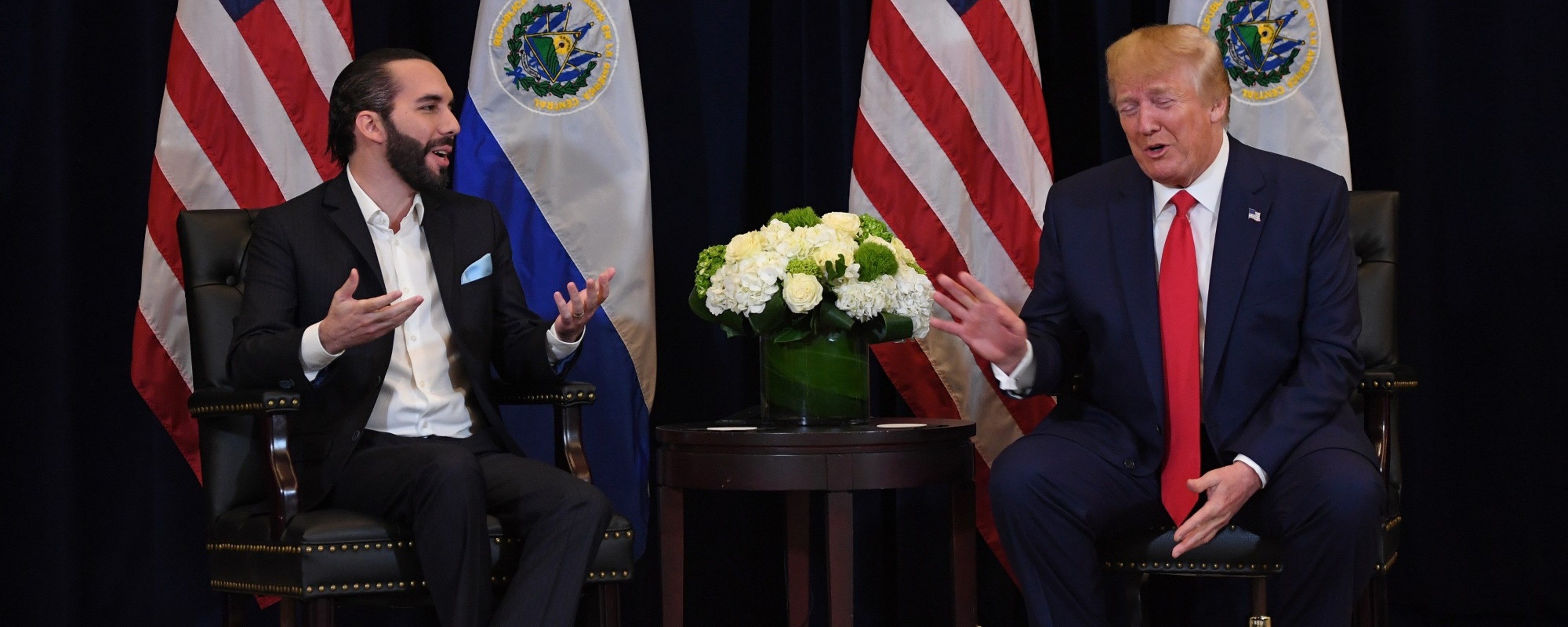On at least four occasions, U.S. presidential candidate Donald Trump has accused Salvadoran President Nayib Bukele without proof of sending assassins to the United States to lower the homicide rate in the Central American nation. He aired the accusation for the first time in July, in his acceptance speech at the Republican National Convention, one of the most critical stages of the Republican Party. He then repeated the line at least three times at campaign stumps around the United States.
In the latest of the attacks that I have documented, Trump claimed that after reading coverage in The New York Times of the supposed reduction of homicides in El Salvador, he “realized” that Bukele’s strategy was to arrest criminals to “dump them into our country.” Trump’s own words show that his tongue-lashing of Salvadorans was his deliberate choice. They triggered an earthquake among propagandists, allies, and followers of Bukele for whom the former U.S. president’s accusations amounted to friendly fire — especially needless against an ally, Bukele, who has publicly voiced preference for Trump over his successor, Joe Biden.
Since he rose to power, Bukele has become an imitator of Trump. The Salvadoran president has invested hefty sums in diplomacy to ingratiate himself with the propaganda ecosystem close to Trump. The two men met only once, in 2019, but more importantly, Bukele has spent hundreds of thousands of dollars, according to public U.S. records, to court the most hardline corners of the Republican Party.
From that continual search for validation was born the Congressional El Salvador Caucus, a tiny group of legislators chaired by far-right conservative Congressman Matt Gaetz. Gaetz, a Trumpland fan favorite, is nonetheless despised by many of his Republican colleagues for leading the ouster of House Speaker Kevin McCarthy. In June, Congress opened an ethics probe into Gaetz following allegations of sexual misconduct and illicit drug abuse. Gaetz, Donald Trump Jr., and other Republican politicians and commentators attended Bukele’s unconstitutional June inauguration as a gesture of appreciation toward Bukele, their loyal fan. In their world, Bukele has become an emerging celebrity who, according to Tucker Carlson, may have hatched “the plan to save the world” in the state of exception in El Salvador, which has led to the incarceration of almost 1.7 percent of the country’s population.
But to Bukele’s chagrin, in Trumpian heaven, prophets are ordained by Trump himself, not even by his children. The man simply does not respond to the logic of conservative alliances devised by the likes of Florida Senator Marco Rubio. Rubio has inherited a cold-war vision that divides the region into right and left and seeks to establish aligned governments in the region to thwart the supposed advance of communism. Trump’s roadmap is different: It is the United States versus the world.
Under that magnifying glass of nativist nationalism, Central America and El Salvador are seen as dangerous places that produce nothing more than migrant caravans, gangs, and “bad hombres.”
The only solution: lock down U.S. borders and begin mass deportations. To Trump’s campaign, the relationship with Central America is one of disdain, resting on the idea that the region is unsavable, only manageable. In the dark Central America envisioned by Trump, there is no room for the El Salvador of Bukele’s fictions, where security is under control and the economic bonanza is around the corner. Carlos Ponce, associate professor at the University of Fraser Valley, argues that Trump sees El Salvador and Central America from the prism of the criminal gangs operating in the region, like MS-13. “This complicates the scenario for the Salvadoran president, who clearly betted on Trump,” Ponce told me.
In Trumpian diplomacy, there are no negotiations with “dangerous countries” like El Salvador. There are only conversations to administer unilateral decisions. When Bukele negotiated with Trump from 2019 to 2021, the Salvadoran government succumbed to the desires of the United States. Trump forced him to accept without question the possibility of a mass deportation of at least 200,000 Salvadorans with temporary U.S. residency permits and, at the same time, convert the country into a reception place for asylum seekers. In those days, Trump had suspended cooperation with Central America and had described El Salvador a “shithole country.” This is the very roadmap he has given his base if he returns to the White House: a dynamic in which he dictates and his counterpart transcribes. There is no room for another strongman.
Trump’s baseless accusations against Bukele point to shifting alliances in Trumpism. I have reported on the profound distrust toward Bukele within conservative political and security circles for months. One of the reasons for the profound distrust toward Bukele in certain U.S. conservative power circles is his relationship with China. The other, perhaps worse, is Bukele’s former truce with the Salvadoran gangs. The disagreements between the two men date back to December 2020, when the Trump administration requested the extradition of 14 senior MS-13 leaders. Bukele refused. Not only that, the Bukele administration freed one of the gang figureheads and helped him escape to Guatemala. That said, most of the men facing extradition requests appear to remain in custody in El Salvador.
Whether out of vanity, prejudice, or competition among Republican elites, Trump appears to have found the scapegoat of the moment: Bukele, a “bad hombre” who takes advantage of the United States. Contrary to the Democrats, Trump has never needed to appear benevolent on immigration to gain votes. To win in November, he is playing to the minds of electors who believe in a supposed invasion of foreigners coming for their jobs and public resources. Trump is tempestuous and known to change his mind, but the cruelty of his words toward the Salvadoran president makes another thing clear: Bukele has no choice but to follow.

